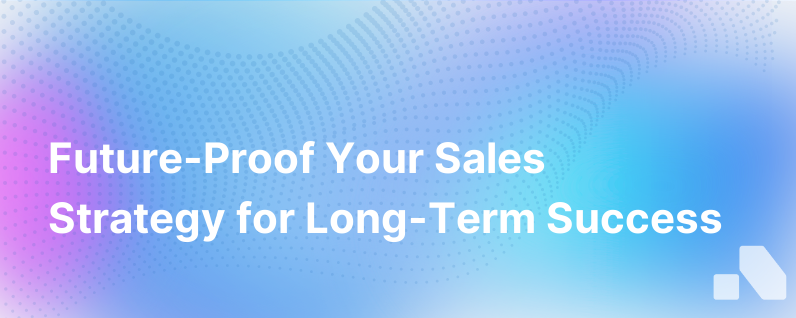Future Proof Sales
Published on December 28, 2023 by David Zhang
In an age where change is the only constant, businesses face the daunting task of staying relevant amidst evolving markets, consumer behaviors, and technological advancements. The landscape of sales, with its heartbeat tied closely to these shifts, is particularly susceptible to such changes. Ensuring your sales force remains effective both today and tomorrow involves a delicate blend of foresight, agility, and continuous learning. Here, we outline strategies to future-proof your sales force, ensuring sustained success in an unpredictable business climate.
Embracing Technological Advancements
As artificial intelligence, machine learning, and automation become more sophisticated, adaptation isn't a choice—it's a necessity. Incorporating these technologies into your sales processes can enhance efficiency, provide deeper customer insights, and facilitate the predictive forecasting of market trends.
The introduction of advanced CRM systems, for example, boosts your ability to collate and analyze customer data, leading to more personalized and timely interactions. Technologies such as Aomni not only streamline account research and provide competitive insights but also dynamically personalize sales content for each client within minutes, reducing manual effort significantly.
Leveraging Data and Analytics
Big data and analytics are revolutionizing the sales industry by empowering businesses to make decisions based on actionable insights rather than intuition. Sales personnel equipped with data-driven strategies can hyper-target prospects, refine their pitches, and close deals more effectively.
Sales teams must be proficient in interpreting and utilizing data. This means not only gathering substantial metrics but also implementing systems and training that enable sales representatives to translate such data into valuable sales narratives.
Continuous Skills Development
As the sales environment mutates, ongoing training and skills development become crucial. This isn't limited to onboarding processes but involves a continuous loop of learning. Training should encompass both the hard skills—like mastering new sales technologies and platforms—and the soft skills, such as adaptability, problem-solving, and relationship-building.
The rise of online learning platforms makes it easier than ever to keep skills fresh. Sales teams should be encouraged to frequently engage with new courses, webinars, or workshops and stay updated with the latest sales methodologies and best practices.
Empowerment through Autonomy
The future belongs to organizations that move away from strict hierarchical structures and empower their salespeople with greater autonomy. A team that's trusted to make decisions on the front lines is nimble and better positioned to respond to rapid market changes.
Sales representatives who can swiftly adjust tactics or course-correct without navigating through layers of bureaucracy are invaluable assets in the unpredictable sales future. Such empowerment must be supported by a culture of trust, accompanied by providing access to real-time data and robust support tools.
The Shift to Consultative Selling
The era of transactional selling dwindles as consultative or solution-based selling takes the forefront. Modern buyers are well-informed and expect sales interactions to add value beyond the product being sold. Future-proofing your sales strategy means embodying the role of a consultant.
Sales professionals need to be experts not only on their products but also on their client's industries, challenges, and competitive landscapes. When paired with solutions like Aomni that provide real-time account insights, sales teams can tailor their approach to address specific challenges, positioning your product not just as a purchase but as a strategic solution to their problems.
Integrating Customer Success
The future sales framework blurs the line between sales and customer success. It is essential to foster post-sale relationships to ensure customer satisfaction and retention. Sales teams should work closely with customer success to monitor client outcomes, anticipate needs, and identify opportunities for upsells or cross-sells.
Loyal, satisfied customers become brand advocates and a source of long-term revenue, making the integration of customer success into the sales process a pivotal part of future-proofing efforts.
Investing in Sales Enablement
Sales enablement encompasses the tools, content, and training required to bolster sales performance. A solid sales enablement strategy ensures your team has easy access to updated content, streamlined communication channels, and platforms that enhance collaboration both internally and with clients.
For instance, intelligent platforms like Aomni provide personalized and actionable content, which greatly diminishes prep time and equips sales representatives with the tools needed for success.
Anticipating Future Trends
Lastly, yet crucially, staying ahead of the curve demands predictive vigilance. Future-proofing sales involves not just adapting to trends as they arrive but anticipating them to stay a step ahead of competitors.
Regularly revising sales strategies, staying attuned to shifts in consumer behaviors, and adopting innovative practices before they become industry standards are all vital practices for a future-proof sales team.
Conclusion
Embarking on the journey to future-proof your sales team is not a destination but a continuous evolution. By embracing technology, enhancing data literacy, fostering continuous learning, and providing autonomy and support, businesses can create a sales force that not only survives but thrives in the face of future challenges.
Equip your sales team with actionable competitive insights and personalized sales content delivered swiftly by Aomni—empowering them to win more deals with less effort, thus future-proofing your revenue stream.